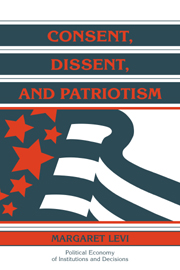Book contents
- Frontmatter
- Contents
- Series editors' preface
- Acknowledgments
- 1 HISTORY AS POLITICS
- 2 THE CONTINGENCIES OF CONSENT
- 3 GONE FOR A SOLDIER
- 4 THE PRICE OF CITIZENSHIP
- 5 THE INSTITUTION OF CONSCRIPTION
- 6 GIVING AND REFUSING CONSENT: CITIZEN RESPONSE IN THE CANADIAN CONSCRIPTION CRISES
- 7 A WEAPON AGAINST WAR: CONSCIENTIOUS OBJECTION IN THE UNITED STATES, AUSTRALIA, AND FRANCE
- 8 THE DEMOCRATIZATION OF COMPLIANCE
- Bibliography
- Index
- Titles in the series
2 - THE CONTINGENCIES OF CONSENT
Published online by Cambridge University Press: 10 December 2009
- Frontmatter
- Contents
- Series editors' preface
- Acknowledgments
- 1 HISTORY AS POLITICS
- 2 THE CONTINGENCIES OF CONSENT
- 3 GONE FOR A SOLDIER
- 4 THE PRICE OF CITIZENSHIP
- 5 THE INSTITUTION OF CONSCRIPTION
- 6 GIVING AND REFUSING CONSENT: CITIZEN RESPONSE IN THE CANADIAN CONSCRIPTION CRISES
- 7 A WEAPON AGAINST WAR: CONSCIENTIOUS OBJECTION IN THE UNITED STATES, AUSTRALIA, AND FRANCE
- 8 THE DEMOCRATIZATION OF COMPLIANCE
- Bibliography
- Index
- Titles in the series
Summary
We are coming, Father Abraham, three hundred thousand more,
From Mississippi's winding stream and from New England's shore;
We leave our ploughs and workshops, our wives and children too.
With hearts too full for utterance, with but a silent tear;
We dare not look behind us, but steadfastly before;
We are coming, Father Abraham, three hundred thousand more!
James S. Gibbons, “We Are Coming, Father Abraham,” 1862Hell, No!
We won't go!
Chant of protest against the War in Vietnam, 1965When are individuals actively consenting and when are they more passively engaged in conforming or acquiescing? How much difference does it make to the everyday practice of democratic governance whether it is consent or not? How is policy-making influencing and influenced by behavioral consent? The model of contingent consent offers a means to begin to answer these questions both logically and historically. When citizens believe government actors promote immoral policies, have ignored their interests, or have actually betrayed them, citizens are unlikely to feel obliged to comply with the laws. The discovery that some citizens are failing to contribute reduces the willingness of otherwise willing citizens to comply. Failure to achieve contingent consent constrains policy-making, but government actors can affect the extent of contingent consent by means of their policies, institutional arrangements, and administrative practices. These are the central arguments of the book.
- Type
- Chapter
- Information
- Consent, Dissent, and Patriotism , pp. 16 - 41Publisher: Cambridge University PressPrint publication year: 1997
- 1
- Cited by

